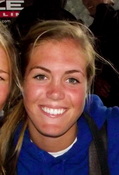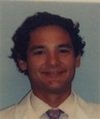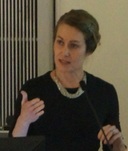Current Investigators
|
|

Kilian Pohl
Kilian Pohl is the Program Director for image analysis in the Center for Health Sciences at SRI and a Consulting Assistant Professor at Stanford University. He received his doctorate in computer science from the Massachusetts Institute of Technology and was faculty at the Harvard Medical School and the University of Pennsylvania. His main research interest is to develop technology for automatically discovering imaging phenotypes from high dimensional medical images with the goal of improving the understanding, diagnosis, and treatment of diseases. In 2014, Dr. Pohl was awarded an NIH Creative and Novel Ideas Reseach Award (CNIHR) to identify image phenotypes specific to HIV and HAND in aging patients under Dr. Valcour's mentorship. He is currently the co-PI for the MIND Study. |
Past Mentees
Meredith Greene

Dr. Greene is an assistant professor in the Division of Geriatric Medicine at UCSF. Her research focuses on the frequency of geriatric syndromes in older adults living with HIV and she is interested in understanding how to improve care for these individuals. She has worked with Dr. Valcour on a number of projects studying polypharmacy, frailty and other geriatric syndromes in the HIV Over 60 Cohort.
Alexander Hsiao

Alexander is a senior at Johns Hopkins University studying Pre-Medicine and Public Health. He spent the summer of 2017 working at the Memory and Aging Center under the guidance of Dr. Valcour to analyze functional testing performance in participants with HIV-associated Neurocognitive Disorders (HAND).

Mary Obasi
Mary graduated from UC Berkeley in May 2013 with a B.A. degree in Public Health and is currently a medical student at UC Davis. She was awarded an NIH Minority Supplement Award to work with the Valcour lab, in collaboration with the Women's Interagency HIV Study (WIHS), to understand the extent to which liver health impacts aging HIV+ women in the US. Hannah Jang
Hannah investigated self-assessments of cognitive function as they relate to objective measures of cognition and depressive symptoms as a pre-doctoral student at the UCSF School of Nursing. In 2016, Hannah accepted a fellowship at the Kaiser Division of Research in Oakland.

Kyra Hansson
Kyra interned with the Valcour lab as a post-baccalaureate student at Mills College. Working with data from the AFRICOS study, she examined the association between infectious and non-infectious comorbidities and cognition among HIV-infected patients in East Africa. Following her internship, Kyra was accepted into the UC San Diego School of Medicine. Nisha Kumar
Nisha Kumar is an undergraduate student at UC Berkeley studying Neurology and Public Health. She hopes to expand on her interests in neurodegenerative disease and global health by pursuing a career in clinical neuropsychology. Under the guidance of Dr. Valcour and his lab, she studied symptom management for patients with HIV-associated Neurocognitive Disorders (HAND) in Summer 2015.
Idil Kore
Idil Kore graduated from Princeton University in 2010 with a B.A. degree in Psychology and minor/certificate in Global Health & Health Policy. She is currently a medical student at the Yale School of Medicine. In the summer of 2012, she worked in Bangkok on a project identifying neuropsychological testing impairment among acute infection subjects in SEARCH 010. These data were presented as a platform presentation at the Conference on Retroviruses and Opportunistic Infections in 2013 and the 6th International Symposium on HIV Neuropsychiatry. She also published her findings in a 2015 article in JAIDS.
Jerome Atputhasingam

As a UCSF medical student, Jerome completed a summer project within the MSTAR program in 2012 investigating the role of apolipoprotein E4 on cognition and brain size in older HIV+ patients. His work was presented at the American Geriatric Society scientific meeting and the New England Science Symposium of Harvard Medical School. Jerome was accepted to the Johns Hopkin's Bloomberg School of Public Health's Masters in Public Health program as a Sommer Leadership Scholar.
|

Kalei Hosaka
Kalei spent summer 2018 as a National Institute of Aging Medical Student Training in Aging Research (MSTAR) scholar with UCSF, and is a mentee of Dr. Victor Valcour. His research focused on aging-related syndromes (geriatric syndromes, frailty, and multimorbidity/VACS index)—and HIV-associated monocyte activation, with the hope of better understanding geriatric conditions of older adults living with HIV and cognitive impairment. 
CJ Lucas
CJ graduated from Johns Hopkins University in 2014 with a B.S. in Molecular and Cellular Biology and History of Science, Medicine, and Technology and then wet on to attend medical school at UCSF. Over summer 2015, CJ worked with the Valcour lab as an MSTAR student examining polypharmacy and anticholinergic score as correlates to cognitive impairment. His work was presented at the American Geriatric Society Annual meeting, 2016, in Long Beach, CA. Eli Nash
Eli graduated in 2012 from San Francisco State University with a B.A. in anthropology, before attending Mills College as a pre-medical post-baccalaureate student, with hopes to pursue a medical career in LGBT-related healthcare. He volunteered as a clinical assistant at the San Francisco General Hospital and was a research intern at the Memory and Aging Center.
Wesley Chin
Wesley graduated from the University of California, Irvine in 2009 with a B.S. in Ecology & Evolutionary Biology and a minor in Spanish. He then went on to medical school at UCSF. In early 2013, he worked in Thailand and spent time at SEARCH to understand the role of nutrition on neurocognitive performance in HIV+ children as a part of the SEARCH 012 cohort.

Brandon Perkovich
Brandon graduated from Harvard College in 2011 after majoring in the History of Science, with a focus on the History of Medicine. As a UCSF medical student, Brandon spent a summer with the Valcour Lab, completing an MSTAR analysis project, investigating the Neuropsychiatric Inventory in relation to cognitive status within the HIV Over 60 Cohort Study. Brandon presented his findings in a poster platform at the 2014 American Geriatrics Society's annual meeting in Orlando, Florida. Eric Lau

Eric graduated from Stanford University with a B.A. in Human Biology in 2011 and then went on to medical school at the John
A. Burns School of Medicine at the University of Hawaii. Previously, he worked as a clinical research coordinator at the University of Hawaii investigating neuropsychological effects of HIV and drug use. Eric spent a summer with the Valcour lab as an MSTAR student examining Parkinsonian feautures in our local HIV Over 60 Cohort Study as compared to controls and Alzheimer's patients. 
Donovan Barfield
Donovan graduated from Stanford University in 2012 with a double major in chemistry and biology and then went on to medical school at UCSF. Within the Valcour lab, Donovan completed a summer MSTAR analysis project examining the CNS penetration effectiveness scores of various HIV antiretroviral medications across cognitive diagnostic groups. His analysis was presented in abstract and poster form at the 2014 American Geriatrics Society's Annual Conference in Orlando, Florida. |
Databases available for mentored projects through consultation
UCSF HIV Over 60 Cohort: This database includes nearly 100 HIV-infected subjects over the age of 60 at the time of evaluations. The assessments are primarily neurological and includes multimodal brain imaging, functional information, neuropsychological testing and neurological examinations. Some longitudinal data are available.
Completed analyses:
AFRICOS: The first patient was enrolled in January 2013. This database will ultimately have 3000 subjects with HIV and 600 without from four countries in Africa. Five cognitive measures will be completed annually.
Completed analyses:
SEARCH 010: This extensive database includes data captured from HIV patients just prior to starting antiretroviral during acute HIV, then longitudinally thereafter. Neurological measures include neurological examinations, neuropsychological testing, lumbar puncture with stored CSF, and leukophoresis with stored viable cells among many other variables.
Completed analyses:
SEARCH 011: This dataset includes 60 chronically infected adults evaluated before and after antiretroviral therapy for the first time. Instruments available include clinical lab data (from CSF and plasma), neuropsychological measures, neurological examinations, and MRI and MRS scans. All cases have clinical characterization of cognition based on published criteria. Data for baseline, six-month, and one year follow-up are now available.
SEARCH 012: This study has neuropsychological, clinical, neurological and developmental longitudinal data on 600 children from Cambodia and Thailand, equally divided into 4 groups of 150: HIV+ randomized to ARV treatment immediately upon enrollment, HIV+ with deferred ARV until they meet WHO criteria to start, HIV exposed but negative children, and HIV-unexposed controls.
Completed analyses:
Completed analyses:
- Self-perception of cognitive limitations as they relate to objective testing of impairment - Hannah Jang RN (mentored project)
- White matter hyperintensities in HIV over 60 - clinically relevant? - Edgar Busovaca (mentored project)
- CNS Penetration Effectiveness compared to cognitive impairment status - Donovan Barfield, UCSF Medical Student (MSTAR mentored project)
- Neuropsychiatric Inventory correlates of cognitive impairment - Brandon Perkovich, UCSF Medical Student (MSTAR mentored project)
- Everyday function and cognitive impairment (published in AIDS Research and Human Retroviruses) - Stephanie Chaio, UCSF Medical Student (mentored project) and Lauren Wendelken
- Impact of APOE4 on cognitive function and brain morphometry - Jerome Atputhasingam, UCSF Medical Student (MSTAR mentored project)
AFRICOS: The first patient was enrolled in January 2013. This database will ultimately have 3000 subjects with HIV and 600 without from four countries in Africa. Five cognitive measures will be completed annually.
Completed analyses:
- Evaluating the impact of violence and mental health on medical outcomes for HIV-infected patients in East Africa - Susan Meffert, UCSF School of Medicine Assistant Professor in Psychiatry
SEARCH 010: This extensive database includes data captured from HIV patients just prior to starting antiretroviral during acute HIV, then longitudinally thereafter. Neurological measures include neurological examinations, neuropsychological testing, lumbar puncture with stored CSF, and leukophoresis with stored viable cells among many other variables.
Completed analyses:
- Longitudinal assessment of neuropsychological testing performance before and after antiretroviral therapy - Idil Kore, Yale Medical School Medical Student (mentored project)
SEARCH 011: This dataset includes 60 chronically infected adults evaluated before and after antiretroviral therapy for the first time. Instruments available include clinical lab data (from CSF and plasma), neuropsychological measures, neurological examinations, and MRI and MRS scans. All cases have clinical characterization of cognition based on published criteria. Data for baseline, six-month, and one year follow-up are now available.
SEARCH 012: This study has neuropsychological, clinical, neurological and developmental longitudinal data on 600 children from Cambodia and Thailand, equally divided into 4 groups of 150: HIV+ randomized to ARV treatment immediately upon enrollment, HIV+ with deferred ARV until they meet WHO criteria to start, HIV exposed but negative children, and HIV-unexposed controls.
Completed analyses:
- Nutritional factors and cognition in children from Thailand and Cambodia - Wesley Chin, UCSF Medical Student (mentored project)
Suggested Readings
HIV associated neurocognitive disorders. Infectious Disease Reports. 5(Suppl 1:e8). 2013
Impact of HIV and aging on neurospychological function. Journal of Neurovirology 2012
Impact of HIV and aging on neurospychological function. Journal of Neurovirology 2012
Resources for Mentees:
MSTAR Mentoring Plan for students
Template Analysis Plan
Approach to Research Papers
Diversity and Mentorship
Ethical Conduct in Research
Learning how to do research (in 60 minutes or less!)
How to give an effective scientific presentation
Creating a winning scientific conference poster
Effective Mentoring
NIH Scientific Review
Example Mentor Development Plan More examples can be found here
Mentoring Contract
Template Analysis Plan
Approach to Research Papers
Diversity and Mentorship
Ethical Conduct in Research
Learning how to do research (in 60 minutes or less!)
How to give an effective scientific presentation
Creating a winning scientific conference poster
Effective Mentoring
NIH Scientific Review
Example Mentor Development Plan More examples can be found here
Mentoring Contract
Funding Resources for Mentees:
MSTAR Program: This program links first year medical students to geriatric medicine training and research during the summer preceding their second year. A stipend is provided to successful applicants.
NIH funding sources for mentees: This includes K-series grants.
NIH Minority Supplements
MSTAR Program: This program links first year medical students to geriatric medicine training and research during the summer preceding their second year. A stipend is provided to successful applicants.
NIH funding sources for mentees: This includes K-series grants.
NIH Minority Supplements

